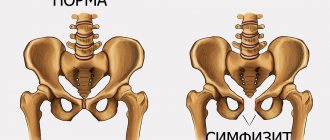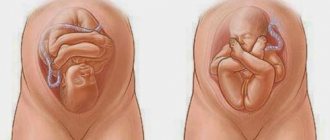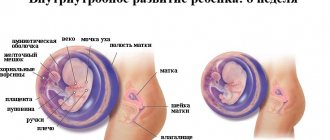Carrying a child is an important and responsible period in a woman’s life. But at times, the feeling of joy from realizing the life that has arisen inside is overshadowed by anxieties and fears that are associated with the baby’s health.
In the context of an epidemic and quarantine, fears are exacerbated - many expectant mothers are worried about the risk of catching an infection and how this will affect the baby. It is not always possible to completely survive the epidemic at home, because pregnant women need to attend antenatal clinics, take tests, undergo ultrasounds and other routine examinations.
Let's try to figure out what you really need to be afraid of in the midst of an epidemic and how to behave as a pregnant woman during the quarantine period, which will last until April 30.
What risks are associated with the disease in pregnant women?
Any viral infection during pregnancy poses a certain risk. Flu and ARVI are extremely undesirable, especially in the early stages. The same applies to coronavirus.
Scientists cannot say for sure how the disease will affect the child, but the possibility of consequences, including the most serious (miscarriage or miscarriage), cannot be ruled out. Therefore, the main task, especially in the early stages, is to try to avoid any viral infection, including coronavirus.
A common complication of coronavirus is atypical pneumonia. For the expectant mother, it is fraught with a decrease in the oxygen saturation of the blood, which can lead to complications and the need for an emergency caesarean section.
The first pregnant woman with COVID-19 in Russia
In Russia, by the morning of March 25, the statistics remained the same: 495 cases of coronavirus (+57 per day in 14 regions of the country). Of the total number, 290 cases occur in Moscow. Only 14 people have recovered in the capital so far.
One death is still known - an elderly patient with a confirmed diagnosis died in a Moscow hospital. True, the cause of death was called a detached blood clot.
The day before, the mayor of the capital, Sergei Sobyanin, admitted that very little testing is being carried out in the country, so the real number of cases in the regions may be higher.
It became known about the first case of coronavirus in a pregnant woman in Moscow. She turned out to be 31-year-old Tatyana Makagon, 23 weeks pregnant. The woman developed complications and was admitted to an infectious diseases hospital in a moderate condition, Telegram channel 112 reports.
Is it possible to transmit coronavirus from mother to fetus?
There is no precise data yet on whether COVID-19 is transmitted from mother to fetus in utero.
So far, only one case of the disease in a newborn has been recorded in the world - on March 14 in London, a test for coronavirus immediately after the birth of the child was positive.
In China, 9 cases of atypical pneumonia caused by coronavirus infection were reported in women giving birth. However, the virus was not found in amniotic fluid, cord blood, or breast milk. The newborn blood test for COVID-19 was also negative[2].
Doctors who work with coronavirus-stricken mothers in the United States believe that the disease is not transmitted in utero.
However, in several new reports that were published in the Journal of the American Medical Association on March 26, researchers suggest that the virus can be transmitted from mother to child through the placenta[3].
Treatment at home is allowed in Moscow
The Moscow Department of Health has authorized the treatment of mild cases of coronavirus infection at home. The new rules are valid from March 23 to March 30. They apply to patients with a temperature of less than 38.5, absence of shortness of breath and severe intoxication, and a blood oxygen saturation level (SpO2) of more than 93%.
The capital is still on high alert, as in all other regions of Russia, but there is no talk of a complete quarantine, the authorities assure. At the same time, people aged 65+ and with chronic diseases were urged to comply with home self-isolation.
Are newborns at risk?
Experts do not consider newborns to be at risk. Infants experience the disease more severely than older children, but less easily than adults. The course of the disease can be severe in children who were born prematurely, with low birth weight or congenital lung problems. Symptoms of the virus in a child may include fever, lethargy, difficulty breathing, and decreased appetite.
Treatment for newborns is symptomatic. If there are breathing problems, oxygen may be added. If there is a bacterial complication, use an antibiotic.
Due to the small number of births in women infected with coronavirus, it is still difficult for doctors to draw conclusions about the course of the disease in newborns.
Sex in the first trimester of pregnancy
This option is very possible, although it has many nuances. During this period, a woman, having just learned that she is pregnant, starting to experience slight toxicosis (and everything like that), as a result of worry about the baby, often independently begins to reject any attempts by a man for sexual intimacy. Because of this, very often there is no sex in the first trimester.
But this does not mean at all that it is strictly forbidden for a woman to have sex. True, there is a so-called threat of termination of pregnancy, but only if earlier pregnancies ended in miscarriages, then, in fact, it is really advisable to abstain from carnal pleasures. Any gynecologist will inform you about this. But this does not mean at all that kissing and other various caresses are strictly prohibited.
How should pregnant women behave during an epidemic?
The main recommendations for expectant mothers are not to panic, reduce contact with other people and follow standard preventive measures.
Wash your hands often with soap. It is especially important to do this after visiting public places and when in contact with other people. Before that, try not to touch your face with your hands. If you cannot wash your hands, use alcohol-based sanitizers.
Try not to contact other people or visit public places unless absolutely necessary.
If you still need to leave the house, wear a medical mask. Be sure to follow the rules for using a mask:
- Before putting the mask on your face, you should wash your hands thoroughly with soap.
- While wearing, do not touch the mask with your hands or other objects and remove it after 2-3 hours or as soon as the mask becomes damp.
- When removing the mask, do not touch the part that covers your face with your hands. Remove it by pulling on the ear loops, throw away the mask, and wash your hands immediately.
Use antiseptics not only for your hands, but also for the air. In pharmacies you can buy Breathe products - oil or inhaler patch. These are products based on pure essential oils with antiviral and antibacterial effects, used for non-contact prevention of ARVI and reduction of cold symptoms.
They are very easy to use. For example, the Breathe inhaler patch is applied to clothing to protect against viruses if you leave the house. Breathe oil in spray form can be sprayed indoors or applied to clothing.
By evaporating during use, essential oils disinfect the inhaled air and thereby help reduce the risk of infection with ARVI, as well as reduce the symptoms of a cold and its complications. The effect of the Oil and the Breathe inhaler patch has been clinically tested - 17 studies have been conducted with the participation of more than 1000 patients. Breathe products can be used continuously throughout the entire epidemic period by both children and adults.
Try to eat right and take vitamins. Pay attention to the Pregnoton Mama complex, which is designed specifically for women during pregnancy and breastfeeding.
Pregnoton Mama contains 16 essential components for mother and child, including methyltetrahydrofolate (a highly active form of folic acid - Extrafolate™), liposomal iron (Lipofer™), Omega-3, a combination of Selenium + Zinc + Vitamin C, as well as vitamin E and vitamins group B. These components are necessary for the expectant mother both for the prevention of acute respiratory viral infections and for the course of a healthy and calm pregnancy, the growth and development of the baby and good health.
It is recommended that Mom start taking Pregnoton during pregnancy and continue taking it after discharge from the hospital while breastfeeding.
Provide yourself with moderate physical activity. There are many pregnancy workout programs online that you can do at home. Do not confuse exercise with cleaning - one does not replace the other.
Try not to panic and stay positive. Instead of reading frightening news, engage in creativity and self-development: books, handicrafts, useful online master classes - all this is quite accessible even during the quarantine period.
Be healthy!
Sources
[1] Health workers in the USA told how they deliver babies during coronavirus 09:23 04/02/2020 - RIA Novosti.
[2] COVID-19 in pregnant women. Manuel B Schmid, Jehudith Fontijn, Nicole Ochsenbein-Kölble, Christoph Berger Dirk Bassler - The Lancet. March 17, 2020.
[3] A trio of studies suggest pregnant women could transfer the coronavirus in utero, contradicting prior research Anna Medaris Miller - Business Insider.
- share with your friends!
Follow us on Facebook:
The benefits of sex during pregnancy
The author of the article is Alexandra Lvovna Shayakhmetova, obstetrician-gynecologist, ultrasound diagnostics doctor. Published in the magazine “Rody.ru” No. 9-2016.
You can't make a baby without sex. What about making love during pregnancy? Isn't it harmful? No, it’s not harmful: doctors believe that if the pregnancy proceeds normally, without complications, then there is no reason to refuse intimacy. And in general, sex during pregnancy has many positive aspects. And both physical and psychological. What will sex give to expectant mother and father?
Good mood
Long-term abstinence during pregnancy may not be liked by either the expectant mother or especially the future father. At a minimum, some hidden dissatisfaction or irritation is possible. But closeness with a loved one, the father of the unborn child, will support the woman’s hormonal levels. By having sex with her man, the expectant mother receives confirmation that she is loved, and this makes her psychologically much more comfortable. In addition, positive emotions help overcome anxiety both during pregnancy and before childbirth. In general, sex for expectant mothers is a source of good mood and well-being. Well, there’s nothing to say about dads!
Greater pleasure _
A woman's body and physiology changes greatly during pregnancy: blood flow to the pelvis increases, the vagina narrows, and the clitoris enlarges. And now the expectant mother can achieve a higher quality, brighter orgasm and experience b o
greater pleasure. And as you know, it is at the moment of orgasm that the body produces a huge amount of the hormone of happiness - endorphin. By the way, it also enters the baby’s body and also gives him positive emotions.
No need to protect yourself
When having sex during pregnancy, you do not need to use protection, which liberates both the man and the woman. Previously, when making love, they had to think about contraception. A woman either had to take hormonal drugs or use local spermicides - not everyone was suitable or liked this. The man had to either use condoms or control himself, and the stronger sex really doesn’t like this in sex. In addition, if pregnancy was not yet planned, then after this method of contraception the woman often became nervous. Or, on the contrary, if a couple really wanted to get pregnant, then for some, sex became “work”: the woman, trying to conceive, chose strictly defined days and hours for this. This was also inconvenient and not very happy. Now, during pregnancy, you can relax and simply enjoy each other, giving your loved one new sensations.
Benefit for health
Like any other woman, a pregnant woman needs useful substances contained in sperm: male hormones, enzymes, prostaglandins. They help soften the cervix, which means that during childbirth it will be able to open better and there will be no risk of rupture. Plus, intimacy, like any physical activity, improves blood circulation, this is especially useful for the uterus, although other organs will also be involved here.
And having sex, no matter how mundane it may sound, prepares the perineum well for childbirth. The tissues do not lose their elasticity, and the likelihood that childbirth will take place without tears or incisions increases.
Preparing for childbirth
Sex during pregnancy is also beneficial because the hormone oxytocin, released during orgasm, causes weak contractions of the uterus. They are excellent preparation for childbirth because they are similar to labor contractions. Thus, with frequent “training,” the muscles of the vagina and uterus will be more elastic, and this will significantly facilitate the birth process. By the way, there is no need to be afraid of orgasm - it was previously believed that orgasm can strongly stimulate uterine contractions and cause premature birth. But it has now been established that if the uterus, its cervix, and also the child are not ripe for childbirth, then contractions of the uterus during orgasm will not affect the state of pregnancy in any way. So orgasm will not cause premature birth.
Induction of labor
If the uterus and the child are “ripe” and the due date has already arrived or is completely behind, then doctors even advise future parents to have sex to stimulate labor. And - what is especially important - sex without a condom. The fact is that sperm contains special substances - prostaglandins, which are necessary for the ripening of the cervix. In the maternity hospital, women whose cervix is not ready for childbirth are given prostaglandins artificially, in the form of a gel. But the natural method will also cause a similar effect: the cervix will soften and open slightly. This method is contraindicated only in two cases: if there is no confidence that the partner does not have a sexually transmitted infection, or when rupture of the membranes and rupture of water have already occurred.
Often during pregnancy, a woman becomes very sexual, her desires and desires are more vibrant than before. Right now, sex can not only preserve, but also increase the intimacy of a couple, so close emotional and physical contact should not be neglected.
Today, restrictions on lovemaking have been completely lifted: doctors believe that sex during pregnancy is harmless - if, of course, the pregnancy is “strong” and proceeds without threatening conditions
A woman (and especially during pregnancy) should listen to her desires, and not to the desires of her partner. And if she wants sex, then there is no reason to deny herself it. And if he doesn’t want to, then questions on this topic shouldn’t arise.
Expectant mothers have different attitudes towards bodily changes during pregnancy: some tolerate pregnancy easily, others not so much. The attitude towards sex often depends on this: some women are ready for it, while others cannot even think about it. Both situations are normal
Shayakhmetova Alexandra Lvovna Obstetrician-gynecologist, Ultrasound diagnostics doctor Mother and Child Clinic South-West
- Find out more about the doctor
- Make an appointment
Other articles by the author
- Vitamin D and what it does
One of the most important vitamins that takes part in the formation and development of baby’s organs is vitamin D.
- Festive table for the expectant mother
The author of the article is Alexandra Lvovna Shayakhmetova, obstetrician-gynecologist at the Mother and Child clinic South-West. The article was published in the magazine “Rody.ru” No. 1-2018
New Year is always a festive table with various salads, snacks, hot and traditional champagne. What should expectant mothers eat on this holiday? Should you create a special menu for yourself or eat everything? Both are extremes, but we need a golden mean, and we’ll tell you about it.
- I'm going on maternity leave
The author of the article is Alexandra Lvovna Shayakhmetova, obstetrician-gynecologist, ultrasound diagnostics doctor at the Mother and Child clinic, South-West. Published in the magazine “Rody.ru” No. 6-2017.
Everyone has heard that sooner or later the expectant mother goes on maternity leave or maternity leave. But even pregnant women themselves do not have a very clear idea of what it is - it seems that before and after childbirth you don’t have to work for some time, plus they have to pay you something else. In fact, there is no such term – “maternity leave” – in our legislation at all. This is what people call two types of leave: maternity leave and child care leave. And they receive and pay for them in completely different ways.
- Face and body care during pregnancy
The author of the article is Alexandra Lvovna Shayakhmetova, obstetrician-gynecologist, ultrasound diagnostics doctor.
Very often, pregnant patients ask questions about face and body care, what is possible and what is not...
- Frozen (non-developing) pregnancy
The diagnosis of “non-developing pregnancy” indicates that the pregnancy developed normally for some period of time, and then for some reason the fetus died. and the pregnancy stopped developing. And although this can happen at any time. In the vast majority of cases, pregnancy regression occurs in the first trimester.
- Women's consultation: your rights
The author of the article is Alexandra Lvovna Shayakhmetova, obstetrician-gynecologist, ultrasound diagnostics doctor at the Mother and Child clinic, South-West. Published in the magazine Rody.ru No. 2-2017.
Where is the average expectant mother seen? At the antenatal clinic at your place of residence. And here she often immediately becomes somewhat dependent on this medical institution: she is assigned to a doctor according to her place of residence, she has to go to appointments frequently, and all the time she has to take a bunch of tests and undergo various examinations. Moreover, all this must be done within a certain time frame specified by the doctor, and God forbid you miss any of the appointments or consultations! Yes, examinations during pregnancy are necessary, but you also need to remember about your comfort and your rights. Let's talk about what the expectant mother has the right to in the antenatal clinic.
- Questions for a pediatrician
Shayakhmetova Alexandra Lvovna, obstetrician-gynecologist, ultrasound diagnostics doctor, answers the questions. The article was published in the magazine “Rody.ru” No. 1-2017
TRAIN YOUR VESSELS AND HEART
The cardiovascular system of the expectant mother works with double load: the volume of circulating blood increases, and due to the growing uterus and placenta, the blood supply to the pelvis increases. The walls of blood vessels dilate, the heart rate increases, blood pressure decreases, and all together this leads to less oxygen entering the brain. These are, so to speak, physiological (natural) causes of dizziness and fainting, and they are not dangerous for either the mother or the baby.
What to do:
start training your heart and blood vessels: take part in pregnancy fitness, go to the pool, just walk in the fresh air more often. With regular moderate-intensity physical activity, the cardiovascular system is trained, and the blood vessels respond more adequately to changing environmental conditions, maintaining normal blood flow in any situation.
- Hypertonicity of the uterus
The author of the article is Alexandra Lvovna Shayakhmetova, obstetrician-gynecologist, ultrasound diagnostics doctor. The article was published in the magazine “Rody.ru” No. 12-2016.
“Hypertonicity... Increased uterine tone...” - these words are heard by many expectant mothers. What is hypertonicity? What does it look like and what to do if it appears?
- Help with heartburn
The author of the article is Alexandra Lvovna Shayakhmetova, obstetrician-gynecologist, ultrasound diagnostics doctor. The article was published in the magazine “Rody.ru” No. 11-2016.
Every second expectant mother has heartburn, and this is the most common occurrence during pregnancy. There is nothing wrong with heartburn, but an unpleasant burning sensation very often spoils the mood, irritates, and even forces some expectant mothers to refuse food or limit the amount of it. What can you do to prevent heartburn or relieve its symptoms?
- Nutritional supplements - read the label
The author of the article is Alexandra Lvovna Shayakhmetova, obstetrician-gynecologist, ultrasound diagnostics doctor. The article was published in the magazine “Rody.ru” No. 8-2016.
Today, our diet in most cases is far from natural: milk can be stored for almost six months, the color of some yoghurts is frightening in its unnaturalness, and the composition of ordinary cookies seems to contain at least half of the periodic table. It's all about new technologies, namely food additives that prevent products from spoiling and give them an attractive appearance and tempting taste. Some of these additives are neutral for our health, others are harmful. How can you recognize, among the many products placed on store shelves, which product is of high quality and which will be harmful? We read the labels.
How the site works
The pregnancy calendar is very simple. All site navigation is located on the left side. Conventionally, it is divided into two sections: “tools” and “week navigation”. The tools include a pregnancy calculator, which allows you to calculate your current due date, and an ovulation calculator, which is designed to determine the day of your next ovulation. The week navigation has 40 pages, each dedicated to one week of pregnancy. Each page describes the processes occurring in your stomach, the current development of the fetus, its size and much more. Also, useful tips regarding your well-being and lifestyle are given. The pages are organized week by week in order from 1 to 40.
The weeks are calculated based on the so-called obstetric period, that is, the period that gynecologists most often use to determine the current duration of pregnancy. It is calculated from the first day of your last menstrual period and differs from the actual gestational age by about two weeks. You can calculate your approximate due date using our free pregnancy calculator.











